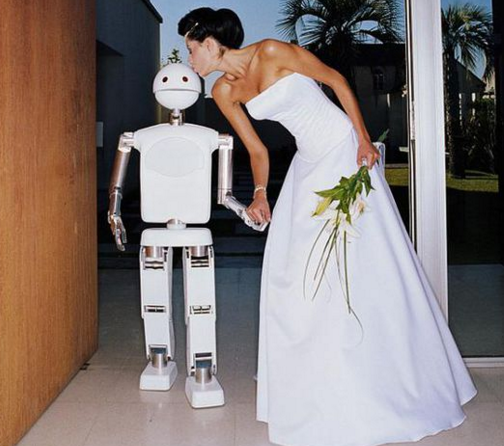(单词翻译:单击)
At last week's "Love and Sex with Robots" conference in London, David Levy, an expert on artificial intelligence, predicted that human-robot marriages would be legal by 2050.
上周在伦敦举行的“与机器人的爱与性”大会上,人工智能方面的专家大卫·勒维预测,人类与机器人之间的婚姻将在2050年前合法化。
Adrian Cheok, computing professor at City University London, supported the view.
伦敦城市大学计算机系教授艾德里安·丘克支持该观点。
"That might seem outrageous because it's only 34 years away. But 34 years ago people thought homosexual marriage was outrageous," said Cheok.
丘克称:“这可能听起来不可思议,因为距2050年只有34年了。但34年前,人们还觉得同性婚姻不可思议呢。”
And though human-robot marriage might not be legal until 2050, Cheok believes humans will be living with robot partners long before then.
他认为,尽管人类与机器人或许要到2050年才能合法结婚,但早在那之前他们就能成为生活伴侣。

He believes robot-human marriages will have an overwhelmingly positive effect on society.
他认为机器人和人类的婚姻将对社会产生极其积极的影响。
"People assume that everyone can get married, have sex, fall in love. But actually many don't," he says. "A lot of human marriages are very unhappy. Compared to a bad marriage, a robot will be better than a human."
他说:“人们认为每个人都可以结婚、做爱、坠入爱河。但实际上许多人并没有。很多人的婚姻都很不幸福。与糟糕的婚姻相比,一个机器人反而会比一个人类好得多。”
Others are less convinced. Oliver Bendel, professor at University of Applied Sciences and Arts in Switzerland, says he does not believe sex or love robots will have moral standing.
不过其他人对此并不信服。瑞士应用科学和艺术大学的教授奥利弗·本德尔表示,人类与机器人的性和爱关系将不会获得道德的支撑。
"Marriage is a form of contract between human beings to regulate mutual rights and obligations including the care and the welfare of children. Perhaps one day robots can have real duties and rights, though I don't really believe it," he says.
他表示:“婚姻是人与人之间的一种合同形式,它被用以管理人与人之间共同的权利和义务,包括对孩子的照顾和福利。也许有一天机器人能够拥有真正的责任和权利,虽然我不相信这会发生。”
However, he acknowledges that human-robot marriage could become legal by 2050 simply in response to public pressure.
但他同时也承认,在2050年前,人类与机器人的婚姻或许因为社会压力而合法。


